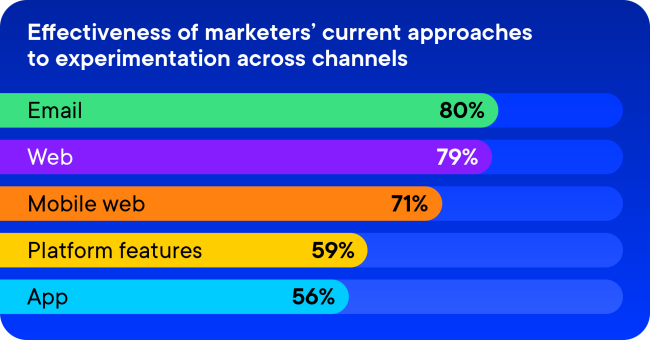What do the colour of Google’s toolbar, Obama’s 2008 Presidential campaign and Airbnb’s referral programme have in common? They are all examples of marketing experimentation success – and generative AI is proving to be an innovation game-changer.
Recent research from digital experience platform provider, Optimizely, ‘Tested to Perfection’ found 75% of marketers believe experimentation is essential to strategic business decision- making. The rapid rise of AI offers marketers immense opportunities to experiment and deepen customer connections through enhanced personalisation.

Marketing experimentation is a systematic approach to testing and optimising marketing strategies, tactics, and initiatives. It involves creating controlled conditions to evaluate the effectiveness of marketing actions such as different advertisements, pricing strategies, promotional offers or content.
The goal is to gather data and insights that inform better decision-making which leads to improved marketing performance. It helps identify the most effective marketing tactics and optimise campaigns for better results through empirical evidence rather than guesswork. It allows testing on a smaller scale before full-scale implementation, thereby reducing risk of costly mistakes. In essence, experimentation is a fundamental practice for enhancing marketing effectiveness and aligning with customer needs and preferences.

Some examples that highlight the power of experimentation include Google’s 41 Shades of Blue. One of Google’s most famous experiments involved testing 41 different shades of blue for its toolbar and ad links. The goal was to find the shade that maximised user engagement and click-through rates. This extensive A/B testing experiment led to a significant increase in ad revenue, demonstrating the value of detailed and data-driven experimentation.
Obama’s 2008 Presidential campaign was a marketing triumph. During the campaign, his team A/B tested extensively on their website to optimise sign-up forms and donations. One experiment tested different versions of a signup button and a hero image. By testing combinations, they identified the best elements, significantly increasing conversions and donations. This data-driven approach was crucial in mobilising campaign support and funding.
AI supercharges marketing innovation
Generative AI can create vast amounts of content quickly and efficiently, including ad copy, blog posts, images and even videos. Recent joint research from Google and Bain identified what differentiates high-growth B2B software businesses from their peers. Companies are reporting new gains from adopting AI, with respondents reporting a 15% improvement in KPIs after implementing AI.
AI analyses large datasets to understand consumer preferences and behaviour patterns and generate individually personalised content and tailored offers. This level of personalisation enhances marketing effectiveness by ensuring that messages resonate with target micro audiences.
Traditional A/B testing is limited, often testing one or two variables at a time. Generative AI can manage multivariate testing, simultaneously testing numerous variables and combinations to identify the most effective elements in a campaign. AI-driven tools reduce the time and resources needed for experimentation. They can automate repetitive tasks such as data collection, analysis and reporting, freeing up marketers to focus on strategy and creativity.
AI algorithms predict outcomes based on historical data, allowing marketers to anticipate the results of experiments before they are run. This predictive capability helps prioritise experiments and focus on the most promising strategies. It enables real-time data analysis and decision-making, allowing marketers to refine campaigns on-the-fly. This agility is particularly valuable in digital advertising, where factors can change rapidly.
Oracle, spotlighted in the Google/ Bain research, is an example of best-in-class marketing experimentation. It has dedicated funding to encourage experimentation and fields innovation teams to accelerate and scale up experiments. The company ran an experiment with an AI-enabled virtual assistant tool that handles communications with customers and provides conversion-ready prospects to sales teams. Even with a few employees dedicated to the project and minimal funding, the AI engine delivered substantial value, putting $140 into the sales pipeline for every $1 invested and increasing conversions fourfold. The company then expanded the team and funding to scale up the tool.
The integration of generative AI into marketing experimentation offers transformative potential. It enhances the ability to test, learn and optimise quickly, leading to effective and efficient marketing strategies. As technology evolves, it will undoubtedly play a central role in how businesses engage with and understand their audiences.
Further reading: https://www.thinkwithgoogle.com/intl/en-apac/future-of-marketing/management-and-culture/marketing-experiment-playbook/










